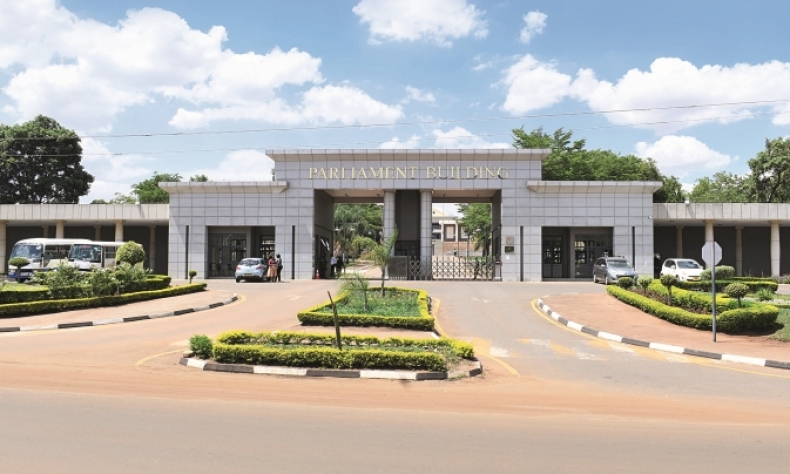Judicial Facility Upgrade

China-assisted state-of-the-art judicial complex construction in Malawi will speed up court processes.
A shortage of courtrooms has long been a challenge in Malawi, especially since more judges were hired to help to streamline the country’s judicial process. Yet, while the current judiciary is headquartered in the country’s second-largest city of Blantyre, due to a lack of work space; some sections of the judiciary are located elsewhere, such as the juvenile, commercial and industrial courts.
So, when the decision came to move the court headquarters to the capital city of Lilongwe, the issue of work space again came under the spotlight.
It is against this background that China stepped forward to offer assistance. This came about during the visit by Malawian President Lazarus Chakwera to Beijing in September 2024, to attend the Beijing Summit of the Forum on China-Africa Cooperation (FOCAC).
On the sidelines of the forum, Malawian Minister of Finance and Economic Affairs Simplex Chithyola Banda, on behalf of his country’s government, signed a $28.7-million financing agreement with China for the construction of a new Judicial Complex in Lilongwe.
Speaking after the signing, Chinese Minister of Commerce Wang Wentao said, “I am delighted to exchange notes on the construction of the Judicial Complex in Lilongwe. This symbolises the strong ties between our two countries. The construction of the new Judicial Complex will help to reduce the time it takes for judicial cases to conclude as the number of court halls will increase, in addition to enhancing the beauty of Lilongwe.”
Improve speed of court cases
The new building stands opposite the Parliament of Malawi – another imposing infrastructure built with a grant from China – and adjacent to it is the Umodzi Park, which houses a five-star hotel, International Convention Centre and Malawi Square, an arena for open door meetings or performances.
Before the parliament building was constructed, members of parliament convened at State House, official residence of the president, which was not ideal.
The Malawian Parliament first allocated funds for the construction of the Judiciary Complex in the 2021/2022 financial year. The project then received a significant boost on 3 September 2024, with the signing of a $28.7-million financing agreement between the Malawian and Chinese governments in Beijing.
This state-of-the-art infrastructure, estimated to be completed in 2028, will encompass four key components: the Judiciary Headquarters housing the Supreme Court of Appeal, six divisions of the High Court, administration block, the chief justice’s residence, sheriffs’ warehouse and the Judiciary Training Institute.
Ministry of Justice Spokesperson Frank Namangale said he is convinced that this facility will ease some of the problems impacting the delivery of quick justice.
“To us at the Ministry of Justice, the construction of a new judiciary complex represents a significant step towards enhancing our justice delivery system,” said Namangale. “This development will provide suitable accommodation for judicial officers, ensuring they have the necessary facilities to perform their duties effectively. Additionally, the new complex will facilitate the conduct of speedy trials, thereby promoting timely justice for all.”
Banda described the Judicial Complex construction agreement as a “fitting gift from the Chinese government to the people of Malawi,” disclosing that Chinese President Xi Jinping informed President Chakwera about the grant during their bilateral meeting that took place at the Great Hall of the People in Beijing, China, on the sidelines of FOCAC in September 2024.
Meanwhile, Chinese Ambassador to Malawi Long Zhou said his government would see to it that the judicial project runs its full course and that relations between the two countries grow from strength to strength.
Good for the country
Malawian human rights activist Michael Kaiyatsa described the development as good news for the country, as after the completion of the complex, people’s rights will be affected through the speedy handling of cases.
“For a long time, we have had instances where judicial officers could not find place to preside over cases. It will be nice to see that there is enough space, not only for the judges, but also judicial staff as well,” said Kaiyatsa.
He also said the magnificent structure will help to beautify Lilongwe.
While in China, President Chakwera held one-on-one talks with President Xi as well as China’s Vice President Han Zhen.
President Chakwera acknowledged the importance of the Belt and Road Initiative (BRI), a framework guiding China’s infrastructure investment across the globe that presents a chance to speed up implementation of the African Continental Free Trade Area. He described the BRI as a wheel that would turn the Global South from poverty to prosperity.
President Xi announced at the FOCAC Beijing Summit that China will provide $51 billion in financial support over three years to implement 10 partnership actions in Africa.
He also said that China has decided to give all least developed countries having diplomatic relations with China, including 33 countries in Africa, zero-tariff treatment for 100-percent tariff lines. This has made China the first major developing country and the first major economy to take such a step. It will help to turn China’s big market into Africa’s big opportunity. China will expand market access for African agricultural products, deepen cooperation with Africa in e-commerce, he said. Malawi is categorised as a least developed country.
 Facebook
Facebook
 Twitter
Twitter
 Linkedin
Linkedin
 Google +
Google +










